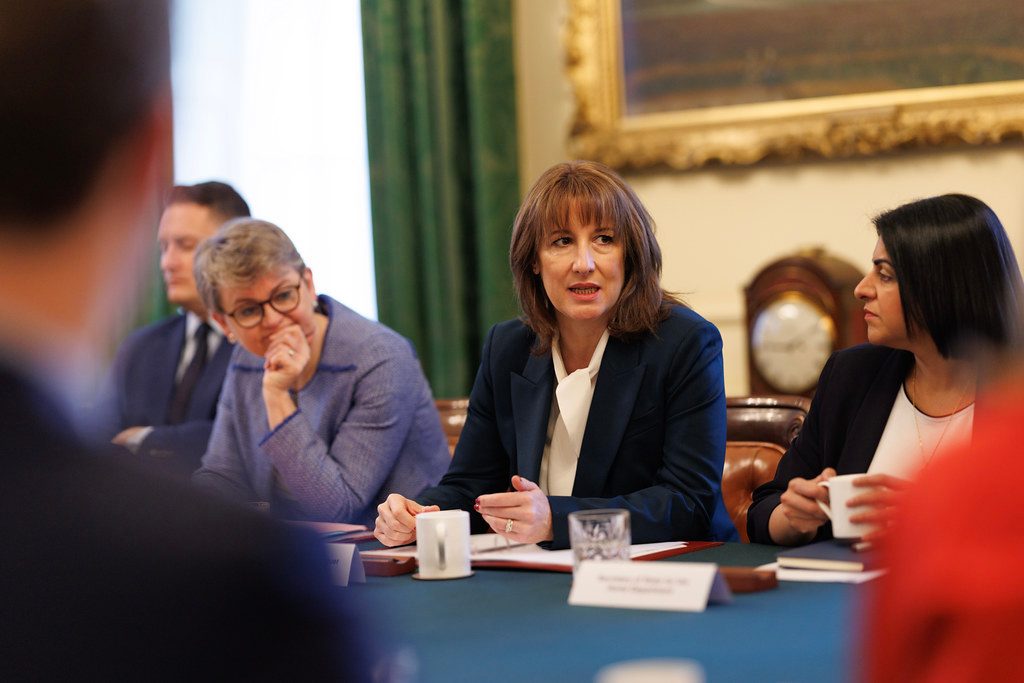Chancellor Rachel Reeves is announcing the 2025 Autumn Budget – a fiscal event with a rocky build-up that’s taking place later than the Budget normally does.
We’ll be live blogging the announcement, with a summary and reactions from experts in the small business world.
Firstly, it seems that the Budget details have been released early by an OBR report which has been prematurely published due to a ‘technical error’.
According to the OBR, inflation is expected to reach 3.5 per cent this year. That’s higher than the estimate of 3.2 per cent. Real GDP is set to grow by 1.5 per cent on average over the forecast. However, the forecast will downgrade after that: In 2026, the economy is now expected to expand by 1.4 per cent, below the previous forecast of 1.9 per cent; in 2027, GDP is estimated to expand by 1.6 per cent against March’s estimate of 1.8 per cent; in 2028, GDP is forecast to rise by 1.5 per cent.
In March, the OBR estimated that it would increase by 1.7 per cent; in 2029, the economy will expand by 1.5 per cent, not the 1.8 per cent forecast.
Read on or go to your preferred section:
- Autumn Budget 2025 and what it means for small businesses
- Autumn Budget 2025 live blog
- What do the small business experts think?
Autumn Budget 2025 and what it means for small businesses
Business rates
Reeves announced that permanently lower business rates will be brought in for thousands of retail, leisure and hospitality business. The plan is to place a higher tax on properties with a rateable value of £500,000 or more. A £4.3 billion support package will also be available to those hit hardest by revaluations in April 2026.
Minimum wage increase
Reeves has confirmed that Minimum Wage for workers over the age of 21 will rise to £12.71 in April 2026, a 50p increase on the current figure. Those aged 18-20 will get 85p per hour extra, going up to £10.85 per hour.
The rate for under 18s and apprentices will be going up by 45p to £8 per hour.
Employers paying the Real Living Wage will have to increase staff pay to £13.45 per hour for outside London (an 85p rise) and £14.80 per hour for those in London (a 95p rise). They have until May 1 2026 to enact the rise but are advised to do so as soon as possible.
What’s more, there are still changes to come in the imminent Employment Rights Bill, which is in its final stages.
Employment Rights Bill – what’s in the legislation? – We take a look at Labour’s Employment Rights Bill and how the business community has reacted to the measures
Funding for training of under 25s
Reeves said that SMEs will have apprenticeships for eligible under 25s paid for.
Property and dividend tax
From April 2027, the property basic rate will be 22 per cent, the property higher rate will be 42 per cent, and the property additional rate will be 47 per cent.
The government said it will also increase the regular and upper rates of tax on dividend income by two percentage points from April 2026. Note that there is no change to the dividend additional rate.
Customs Duty on low value imports
Usually, imported packages of £135 or less would be exempt from Customs Duty. They will be subject to Customs Duty by March 2029 at the latest, according to the government, and a new set of customs arrangements will be discussed for these types of goods.
Salary sacrifice pension contributions
The OBR document says that salary sacrificed pension contributions above the £2,000 threshold will not be exempt from National Insurance.
It will be introduced in April 2029.
Electric vehicle tax to be introduced
The OBR report speaks of “a new mileage-based charge on electric and plug-in hybrid cars from April 2028 at around half the fuel duty rate paid by drivers of petrol cars (raising £1.4bn).”
Hybrid plug-ins will pay 1.5p per mile while fully electric vehicles will pay 3p per mile.
‘Milkshake tax’
The sugar tax is being extended to the likes of mass-produced and imported milkshakes and lattes. ‘Open cup’ drinks prepared in cafés and bars, including your customers’ morning lattes, are exempt. If you use plain cows’ milk or no-sugar-added alternatives, they’re also exempt. However, if you sell pre-packaged sugary milk drinks, then those are included in the tax.
The threshold for the sugar tax is being reduced from 5g to 4.5g sugar per 100ml. Businesses will have until January 1, 2028 to reduce sugar in their drinks.
Corporation tax
The main rate of corporation tax will remain on the current 25 per cent.
However, the main writing down allowance has been reduced, meaning that it will take businesses longer to deduct the cost of equipment and machinery from their taxable profits.
Income tax threshold frozen
Income tax thresholds will be frozen for employed and self-employed workers at their current level for another three years from 2028-2031.
Full expensing and Annual Investment Allowance
Full expensing is to be kept in place, as is the current £1 million Annual Investment Allowance. Read more about them in the articles below:
Hunt replaces super deduction with new tax break
Tax planning tips for small businesses
Reduced CGT relief on disposal of Employee Ownership Trusts
The government will reduce the Capital Gains Tax relief available on qualifying disposals to Employee Ownership Trusts from 100 per cent of the gain to 50 per cent. This will take effect from November 26, 2025.
Read more: Pros and cons of employee ownership trusts (EOTs) – In this article, we explain what an employee ownership trust is along with the pros and cons of moving to this model
Landfill and plastic packaging tax
The government won’t be transitioning to a single rate of landfill tax by 2030 and will keep quarries with disposal permits exempt.
The Plastic Packaging Tax (PPT) rate for 2026/27 will rise in line with CPI inflation. In early 2026, the government will consult on a mandatory certification for mechanically recycled plastic packaging for businesses to claim an exemption from Plastic Packaging Tax.
Read more: Plastic Packaging Tax – what does it mean for my small business? From April 2022, businesses will be liable to pay Plastic Packaging Tax.
We explore what it is and whether it will affect you
Fuel Duty frozen
Fuel Duty is frozen until September 2026. However, there will be a staged increase from 2026.
Frozen train fares
Regulated train fares (including season tickets and some off-peak returns) in England are to be frozen until March 2027.
Autumn Budget 2025 live blog
13.35: Confirmation on fuel duty freeze until September 2026.
13.34: Confirmation of Minimum and Living wage increase.
The government are increasing the National Living Wage to £12.71 an hour from April, giving full-time workers £900 more a year.
This boost will help over 2 million people with the cost of living. pic.twitter.com/iyS0Kq7Q7H
— HM Treasury (@hmtreasury) November 26, 202513.25: 15 – 25 per cent tax increase on online gambling.
13.25: Uprate alcohol duty by inflation plus vaping levy.
13.23: Delay changes to employee car ownership scheme – EV salary sacrifice scheme retained. 100 per cent business rates relief for EV charging stations for 10 years. EV grant scheme extended to 2030.
13.22: EV pay per mile duty confirmed. 1.5p per mile for plug-in hybrid and 3p for fully electric.
13.22: Custom duty on packages of any value.
13.21: Permanently lower business rates for 750,000 retail and hospitality firms paid for by properties whose rates are over £500,000. £4.3 billion business rates support package will cap business rates bill increases for sectors hit hardest by revaluations from April 2026.
13.21: New national licensing law to benefit hospitality businesses. Read more here.
13.20: Reduce relief on capital gains tax on disposals of employee ownership trusts from 100 per cent to 50 per cent.
13.19: Confirmation of tax on £2,000+ salary sacrifice pension contributions.
13:16: Transfer of 100 per cent relief between spouses on agricultural and business assets in line with broader rules.
13.15: Increase basic and upper rate level tax on property, savings and dividend income by two percentage points.
13.11: Funding to make training for under 25s completely free for SMEs.
12.57: Debt down by end of forecast. Commitment to single fiscal event: the Budget.
12.52: AI growth zones in Wales, low carbon innovation in Scotland.
12.50: Extending business rate retention pilots, including Leeds.
This means that Leeds City Council can retain 100 per cent of business rates growth above an agreed baseline for 25 years
12.47: Full expensing and corporation tax rate to be retained.
12.44: Make Britain the best place to start and scale up business. Eligibility for enterprise schemes to be expanded – doubling eligibility for enterprise tax incentives. UK listings release – a new three-year stamp duty holiday for firms that list in the UK.
12.40: Borrowing will fall as a share of GDP every year. Meeting stability rule a year early.
Doubling headroom.
12.35: Rachel Reeves starts her statement. OBR takes full responsibility for error.
12.31: House confirms that OBR document leak was a major incident.
What do the small business experts think?
We’ve gathered some comment from the small business community to see what they made of the Budget.
Tina McKenzie, policy chair of the Federation of Small Businesses, said: “Hikes to dividend tax mean the government continues to make investing in your own business one of the least tax-friendly things you can do with your money. Plans to charge employers for supporting pension savings are a bad idea. The business rates measures will not help small firms and high streets nearly enough.
“Sorting out the Employment Rights Bill, fixing the broken small business energy market and backing more people to start new businesses are all necessary measures we need to see action on immediately.”
Derry Crowley, CEO at leading SME accountancy and business advisory firm Xeinadin, said:
“While this budget doesn’t include any major boosts or tonics for small business owners, it does include a few small nods, such as the free apprenticeship programmes that will help to fuel a talent pipeline for SMEs, alongside both regional and industry specific investments – which, with the right advice, can be taken advantage of to fuel better outcomes for SME businesses.”
Andy Fishburn, managing director of Virgin StartUp, comments:
“Whilst the announcement for new business rates for retail, hospitality and leisure businesses is welcome progress, the little-by-little approach isn’t delivering the complete refresh of the business rates system that UK start-ups desperately need.”
Roan Lavery, CEO and co-founder of FreeAgent, said:
“Measures such as a rise in the minimum wage, an extended freeze on National Insurance and income tax thresholds, rises to tax rates on assets and dividends, and changes to salary sacrifice pension contributions all point in the same direction: higher employment and tax costs over the next few years.
“It’s not all negative.
For example, funding to make training for under‑25 apprentices free for SMEs is a genuinely positive step. Removing that cost barrier will make it easier for small firms to bring in young talent, invest in skills and build the next generation of their workforce. There’s also some good news for AI businesses and those in specific regional areas, as well as the retail and hospitality sector – who will pay lower business rates on their premises compared to warehouses operated by larger multinational companies.”
Michelle Ovens CBE, CEO and founder of Small Business Britain, comments: “Some businesses will be affected by the rise to minimum wage, and entrepreneurs impacted by the increased dividends tax, but we hope these should be outweighed by the predicted stabilisation of the economy.”
Mark Skelton, chief technology officer at Node4, said:
“The freeze on income tax thresholds is pushing more employees into higher tax brackets, meaning companies must pay even more to ensure they see a meaningful increase in take-home pay. It’s a compounding effect that’s squeezing margins across every sector.
For many companies, that has meant slowing down recruitment or rethinking investment plans, which has ultimately hindered business growth.”
Kate Allen, owner of Kingsbridge-based tourism business Finest Stays, said:
“When you increase tax on property income, dividends and savings at the same time as freezing personal tax thresholds, you’re effectively eroding their real return, even if rental income stays the same.
“It means UK business owners have to work twice as hard just to stand still. For agencies like ours, it ramps up pressure to deliver even higher booking values simply so owners can cover rising costs.”
More on the Autumn Budget 2025
Autumn Budget 2025 predictions – what’s in it for small business owners? – As Autumn Budget 2025 comes ever closer, we take a look at the latest predictions and how they could affect small businesses
Disclaimer: This story is auto-aggregated by a computer program and has not been created or edited by finopulse.
Publisher: Source link







